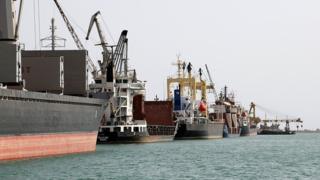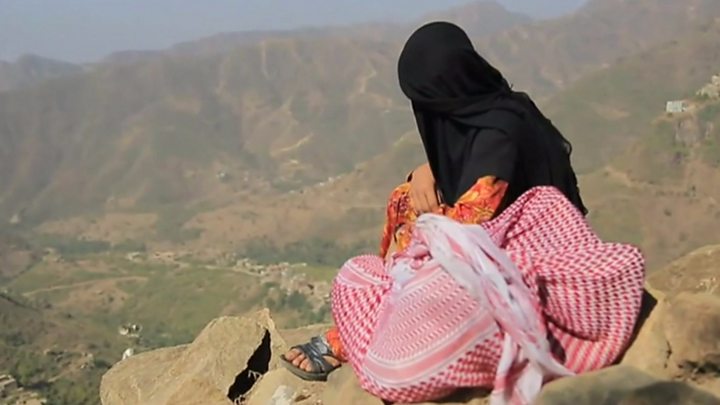 Image copyright
Image copyright
Reuters
Hudaydah port is a humanitarian lifeline for millions of Yemenis
The UN says Houthi rebels have pulled out of three key ports in Yemen, in partial implementation of a peace deal agreed six months ago.
A UN monitoring committee said Hudaydah, Salif and Ras Issa had been handed over to local coast guards.
It said work was still needed to remove trenches, barriers and landmines – and to implement the rest of the deal.
Houthis and government forces agreed to withdraw from Hudaydah to allow in vital humanitarian aid.
However, the BBC’s Lyse Doucet says some Yemenis are sceptical about the latest pull-out and accuse the Houthis of leaving fighters in the ports disguised as coast guards.
Yemen’s government has previously warned that the withdrawal would be a rebel “ploy”.
At least 6,800 civilians have died in Yemen’s four-year civil war, the UN says, and more than 10,000 have been injured.
The conflict has brought the country to the brink of famine, with malnutrition and disease claiming thousands more lives.
What does the UN say?
Lt Gen Michael Lollesgaard, head of the UN’s Redeployment Co-ordination Committee (RCC) in Hudaydah, welcomed the Houthi withdrawal from the ports in western Yemen.
He said that since Saturday there had been “very good co-operation” with Houthi commanders and that the UN had been given access to all areas of the ports.
Image copyright
AFP
Lt Gen Michael Lollesgaard said more work was needed to fully secure the ports
“Today we have together seen the redeployment and we have also agreed that there are a few outstanding issues,” he said.
“There are two minefields in Ras Issa and Salif and trenches in this port [Hudaydah] that need to be removed.”
He urged all sides to help implement the next stages of the peace deal.
Why is Hudaydah important?
Hudaydah port is the main lifeline for two-thirds of Yemen’s population and its closure has had a devastating impact.
Under the deal brokered by the UN in Stockholm December, the warring parties agreed to withdraw from Hudaydah city and the ports of Hudaydah, Salif and Ras Issa.

The Houthi withdrawal marks the first major step in bringing that ceasefire agreement into being.
The UN has repeatedly appealed to both sides for access to a vast store of grain in Hudaydah port that holds enough food to feed 3.7 million people for a month.
Aid workers have been unable to reach the stores for five months, and the UN previously warned that the grain was at risk of rotting.
Pro-government forces have twice tried to seize the port, and accuse the Houthis of using it to smuggle in weapons from Iran. The group and Tehran both deny these accusations.
Why is Yemen at war?
The conflict arose from the failure of a political transition after an Arab Spring uprising that forced its long-time authoritarian President, Ali Abdullah Saleh, to hand over power to his deputy, Abdrabbuh Mansour Hadi, in 2011.
The Houthi movement, which fought a series of rebellions against Mr Saleh during the previous decade, took advantage of the new president’s weakness to take control of their northern heartland of Saada province and neighbouring areas.
Image copyright
EPA
Yemen has suffered a cholera epidemic during the devastating civil war
Many ordinary Yemenis supported the Houthis, and in late 2014 and early 2015, the rebels took over the capital Sanaa, forcing President Hadi to flee abroad.
Alarmed by the rise of a group they saw as an Iranian proxy, Saudi Arabia and eight other Arab states intervened in an attempt to restore the government.
Talks have repeatedly stalled and broken down, and withdrawal deadlines have been missed amid disagreements over who would control the vacated locations.
Yemen war: Houthis withdraw from key ports, says UN}

